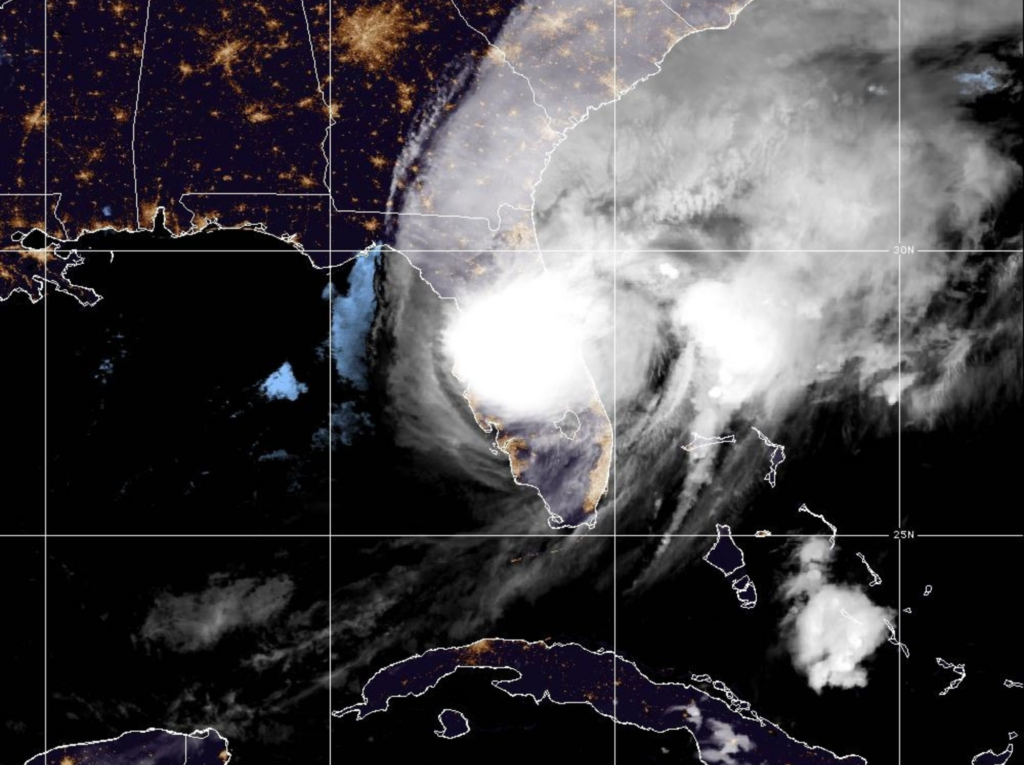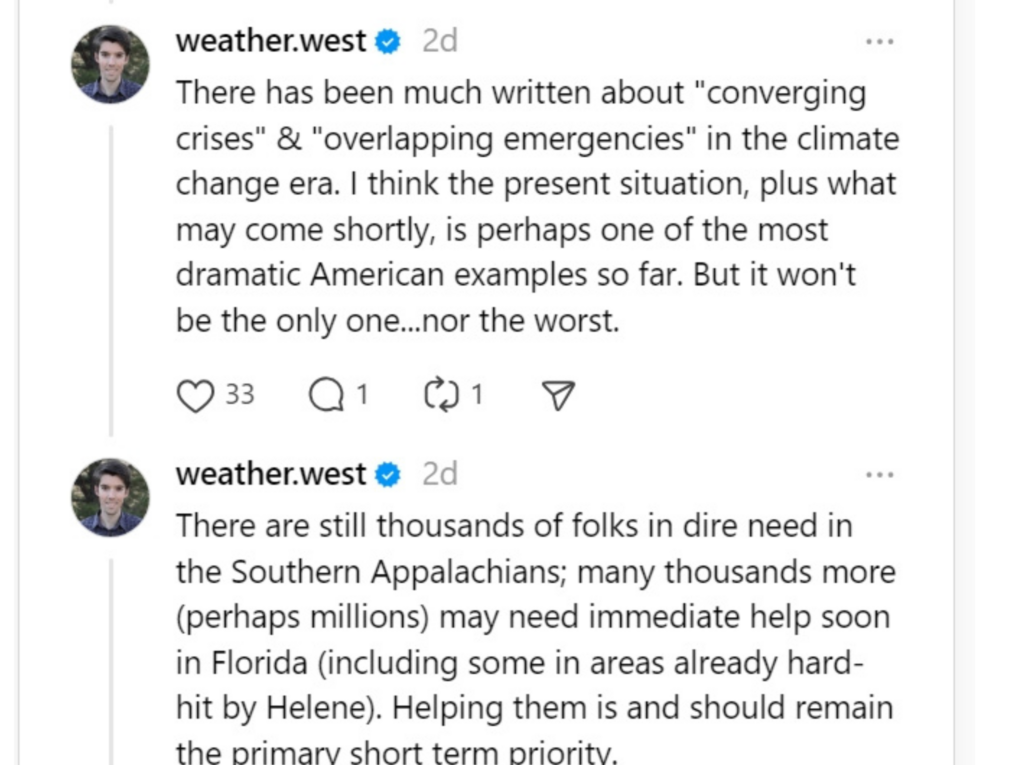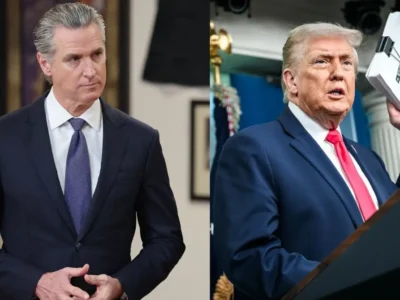Hurricane Milton and this Climate Moment
We’re witnessing the collision of extreme weather, climate science, national news and politics. The question of “Who pays for climate disasters?” is about to become even more important.

When President Biden addressed the nation yesterday from the White House, he warned that Hurricane Milton could be one of the most destructive storms in more than a century, but he stopped short of explaining why — that climate change, fueled by our burning of fossil fuels, is making oceans warmer and storms stronger, capable of metastasizing monstrously.
It’s understandable for the outgoing president to focus on marshaling the National Guard, Coast Guard, and firefighters to rescue, recover, and rebuild — but American audiences need to hear the why and they need it now from trusted sources… Whoever’s left, that is.
This is a moment of reckoning. A “critical and unpredictable new phase of the climate crisis” as several leading climate scientists wrote in an article in the journal BioScience published on Tuesday. We’re seeing that “the new normal is that there is not going to be a new normal,” the New Yorker’s Elizabeth Kolbert wrote this week. “We are living in a new abnormal; storm after storm these are more intense… driven by the warming of the climate,” Democratic Rep. Kathy Castor of Florida told NPR, proving you can in fact touch on both recovery efforts and climate change in a 3-minute interview. “We are witnessing a genuinely extraordinary, and regionally quite deadly and destructive, period for extreme weather in the United States,” Daniel Swain, a climate scientist at the UCLA Institute of the Environment and Sustainability, posted to social media, noting that “the fingerprints of climate change are all over” these recent, overlapping emergencies between Hurricane Helene and Milton, not to mention wildfires in the west.

Milton brought 10-foot storm surge and tornadoes. Three million people are without power. More than 5.5 million people were under storm surge warnings and more than 13 million under a flood watch. Imagine losing your house to a hurricane a week ago and moving into a mobile home only to be forced to evacuate from your trailer? The wind even destroyed the roof of the Tampa Bay Rays’ stadium, while it was being used to house thousands of emergency workers.
FEMA is stretched thin. If another disaster were to occur, less than 10% of agency staff would be available to respond. And even though they have the money for these relief efforts, Homeland Security Secretary Alejandro Mayorkas said this week that FEMA would not have the funds to get through the rest of hurricane season, through November. Yes, Speaker Mike Johnson could bring the House back into session to deal with this emergency, but let’s face it: Congress is not going to do anything with voting already underway in the presidential election. One candidate is exploiting the climate chaos to spread disinformation to gain a political edge. It’s as if we needed a reminder that the 2024 election is a climate emergency election.
We have known, of course, the name of Hurricane “Milton” for months, ever since the World Meteorological Organization selected the names for this hurricane season, which we knew was likely to be historic when the National Oceanic Atmospheric Administration predicted an 85% chance of an above-normal hurricane season. Along came Helene, a historic storm itself, which was described as the Katrina of 2024 and then came Hurricane Milton, which underwent one of the most rapid intensifications ever seen in the Atlantic. NBC meteorologist John Morales went viral for tearing up and emotionally describing how rapidly Milton has grown, due to climate change. In a cruel irony, the wing of NOAA that catalogs the country’s billion-dollar disasters is still crippled because it’s based in Asheville, North Carolina. We just learned that hurricanes are hundreds of times deadlier than anyone has realized according to a study published last week in Nature. Climate reporting has been indispensable the last two weeks, but it has hit a moment of reckoning too. “Climate havens don’t exist: sponsored by Chevron” was the unfortunate Politico newsletter placement that renewed good questions like Why is Chevron sponsoring Hurricane Helene journalism? The appropriate meme response: “Hurricane Helene, sponsored by Chevron.” Meanwhile, the Governor of Florida is presiding over this climate emergency months after signing legislation to erase “climate change” references from state policies and now is taking the personal phone number of the president so that he can be in constant contact for federal support. Will Gov. DeSantis and other Republican leaders accept federal money to rebuild destroyed infrastructure? Of course they will. It’s not unlike the Republicans who trash the Inflation Reduction Act and then ask for hundreds of millions of dollars from Biden’s climate law for their district — “vote no and take the dough.”
All of this is both shocking and not surprising. And yet no one quite predicted that extreme weather, climate science, national news and politics would be on such a dramatic collision course this October. Now, we even need online guides for how to vote during a climate disaster.
Once the waters recede, the question of “Who pays for all this?” will become even more important. Depending perhaps on the outcome of the election, two separate but related efforts to create climate funds will be interesting to watch. The first is the “Make Polluters Pay,” movement, in the form of the NY climate superfund bill that passed both the State Senate and Assembly but needs the governor’s signature. Massachusetts, and Maryland also have pending bills, and there’s federal legislation in Congress introduced a month ago to “require the biggest polluters to begin paying their fair share to confront the climate crisis.” The second is the long-running legal effort to bring state lawsuits against Big Oil for allegedly lying about their products and the risks of climate change for decades. The Supreme Court on Monday asked the U.S. Solicitor General to weigh in on whether they should allow 19 Republican-led states to try to block five Democratic-led states from pursuing lawsuits over climate change against major oil and gas companies in state courts.
These are topics for today.
Because as my UCLA colleague Daniel Swain writes, helping the disaster victims is the priority short-term and “yet if we can’t also manage to have the harder conversations regarding natural hazard risk and disasters and climate change in the moments when people are actually paying attention, we’re never going to solve any of the underlying problems,” Swain says. “I firmly believe we can, and must, do both.”
Reader Comments
7 Replies to “Hurricane Milton and this Climate Moment”
Comments are closed.







Humans aren’t psychologically built to manage a systemic dynamic like climate change by negotiating ongoing, fragmentary agreements across decadal time scales among hundreds of global players. Even if everyone on Earth belonged to one religion whose primary precept was “Solve climate change,” it would still be exceedingly difficult.
Each of our immediate personal interests is structurally at odds with the long-term interests of the group–in this case, all of humankind.
The only way to do it is to change the economic system so that self-interested behaviors are aligned with the long-term goal and rewarded.
That system is to levy a carbon tax on fossil fuel producers and importers, with the revenue rebated to all taxpayers in equal shares, aka a “carbon cash-back.” That would incentivize everyone to reduce their carbon footprint, businesses and consumers alike.
Right now, it’s free to pollute and costs money to not pollute. That’s upside-down. If it cost money to pollute and people made money by not polluting, the climate problem would be well on the way to being solved.
Is a socially just carbon tax the only thing we need? No. But it would create a positive underlying dynamic for the other things we need to do, like actively removing carbon from the atmosphere and reforming the agricultural system.
First, though, we need to honor the Rule of Holes, and stop digging the hole. That what a socially just carbon tax with cash-back would do.
This structure can be effectively exported to other countries via a carbon tariff, or what the EU calls a “carbon border adjustment mechanism” or CBAM. Countries lacking a carbon price would have to pay a tariff to export their goods into a country that does have a carbon price. That approach is much more transparent and immediately effective than hiring boatloads of diplomats to cajole, wheedle, dissimulate, and intimidate foreign powers into working on a never-ending basis against their own self-interests through unenforceable treaties.
Will the fossil fuel companies resist making this structure law? Yes, they do and they will. Because they know it will work. They don’t want to give up their free option to pollute at will, which is worth trillions.
But, unlike the current approach, overcoming that resistance only needs to happen one time. Once a socially just carbon cash-back system were in place and people are making money by not polluting, it would be as hard to undo as Social Security.
I agree that a possible Carbon Border Adjustment Mechanism is going to be one of the other most important debates that we could see in Washington in the coming months, again dependent on the election…
https://legal-planet.org/2024/07/16/is-2025-the-year-of-the-carbon-tax/
Among the religious in Florida, I wonder if they have asked “are we being punished for sinning against the climate that God has created?” First one hurricane and then another immediately after. What type of signal are they looking for?
It reminds me of the joke that seems particularly apropos: A man is perched on his roof as a flood fills his house. He says “God will save me.” First a rescuer comes by in a truck, but he says “God will save me.” Another rescuer comes by in a row boat, but he says “God will save me.” Then a helicopter comes by, but again he says “God will save me.” Then his house is swept away and he dies. As he gets to heaven, he ask God “why didn’t you save me?” God answers, “what do you mean? I sent a truck, a row boat and a helicopter!” Denial of the facts that God has provided can be painful.
Thank you for publishing the thoughtful and timely article by Evan George,”Hurricane Milton and this Climate Moment” (Oct. 18, 2024). I am also grateful that you added the three insightful replies by Ray Welch, Evan George, and Richard MaCann. I will pass on this article and replies to my network of friends and acquaintances. So thanks to yo’ all a ripple will go out from here (Milwaukee).
Also, it would be very interesting and helpful if LegalPlanet would publish an article explaining the debate among climate campaigners regarding a carbon tax. It seems that some climate leader think it is the only practical way to go, while others think it is big a waste of time that will ultimately benefit the fossil fuel industry. It can’t be both –can it? blessings and peace, Tim Kehl
There is not conclusive scientific evidence to support the claim that the intensity and frequency of hurricanes has increased due to climate change.
Climate journalists generally lack the scientific knowledge necessary to understand atmospheric thermodynamics, so they fabricate inaccurate and misleading assertions to incite alarm. Ignore them.
https://wattsupwiththat.com/2024/10/11/milwaukee-journal-sentinel-presents-master-class-on-hurricane-milton-and-climate-misinformation/
Jim, if you cared to seriously think about the science of hurricanes in a changing climate, you could consult lots of scientific papers or NASA / JPL reports on the subject from 2000 to present. As of Aug 2022, there was 400+ papers on the subject. Or you could look at extreme weather attribution studies – Carbon Brief analyzed more than 500 weather events and found that 71% were more likely or more intense b/c of human-caused climate change. Or you could look at the weather attribution studies on Helene and Milton specifically. But assuming you don’t have any interest in that, why don’t you take the word of the biggest oil companies, which have been reporting internally for decades about the impact of fossil fuels on climate and intensification of storms. Or I guess you could keep citing “whatupwiththat.com”…
September 1982: Exxon scientist tells top executives there is “unanimous agreement” about weather shifts
November 1982: Exxon manager warns that rising CO2 will lead to potential global catastrophes.
1988: Shell scientists predict that fossil fuels will lead to extreme storms.
1991: BP makes a film about the climate crisis’ impact on extreme weather. In another film produced that year, called “This Earth—What Makes Weather?”, BP presciently predicted the exact warming mechanism that made hurricanes like Helene and Milton so powerful. “From warmer seas, more water would evaporate, making storms and the havoc they cause more frequent,” the film said. “Catastrophic floods could become commonplace.”
https://heated.world/p/big-oil-knew-monster-storms-were
Dear Evan,
The climate changes, so does weather. Bad weather does not equal climate change.
The great fallacy is “climate mitigation”. It is not technically possible to reverse, effect, control or otherwise mitigate global climate.
There is not one successful mitigation project anywhere on earth and never will be. Climate lawyers and journalists claim to possess special knowledge about how to change the climate back to where it was before industrialization and thereby save the world. Do not trust them, they abhor truth.
Climate mitigation does not work, it is massive government fraud, corrupt, dishonest,
and shameful. Reject and despise all those who spread this enormous lie.